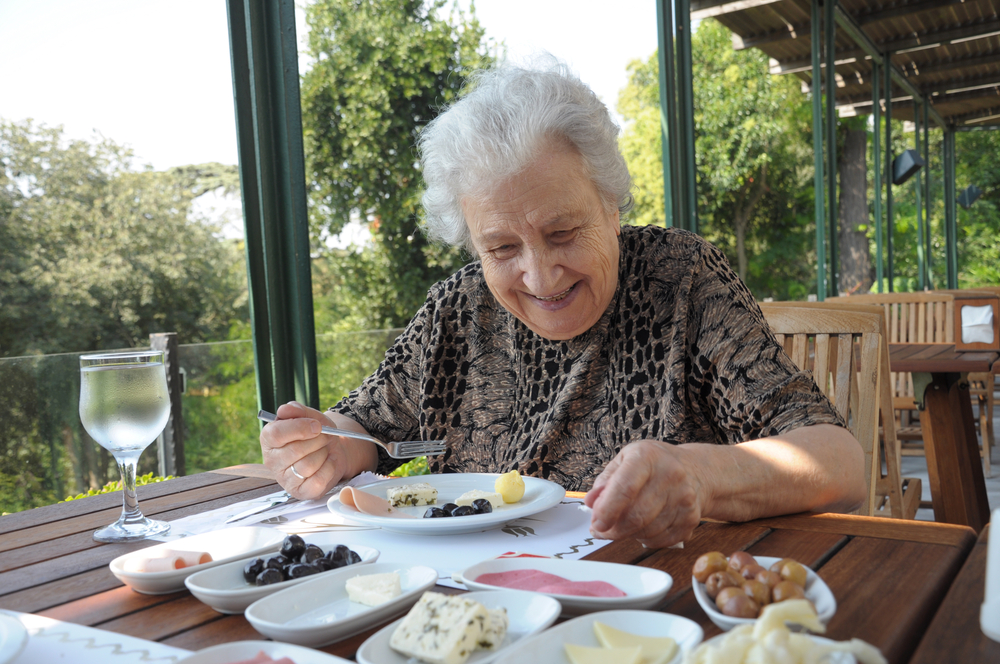Make an Appointment
Mealtimes can become difficult for people living with dementia. They may forget how to use cutlery, struggle to chew or swallow, or lose interest in food altogether. For caregivers, what was once a routine part of the day can feel stressful and exhausting.
Families often ask:
- What strategies can help someone with dementia during meals?
- How can I make meal preparation easier?
- What do caregivers really need most?
- How do I keep my loved one safe while eating?
The good news is that small changes in the mealtime routine can make a big difference. By creating a calm, supportive environment and offering dementia-friendly meals, you can help your loved one eat more comfortably, maintain nutrition, and enjoy mealtimes with dignity.
In this guide, we’ll explore practical mealtime strategies for dementia care, from preparation to safety, and explain how occupational therapists can support caregivers in this journey.

Why Mealtimes Can Be Challenging for People with Dementia
Dementia affects the brain in ways that impact memory, coordination, and sensory processing, making eating and drinking more difficult.
Memory and Recognition Issues
- A person with dementia may forget how to use cutlery or even fail to recognise the food on their plate.
- They might lose track of mealtime altogether, leading to skipped meals or poor nutrition.
Changes in Appetite and Taste
- Dementia can reduce the sense of smell and taste, making food less appealing.
- Medications may also cause nausea or change how food tastes.
Difficulties with Coordination
- Tremors, stiffness, or reduced fine motor skills can make it hard to use utensils.
- They may spill food easily, which can lead to frustration and embarrassment.
Swallowing and Chewing Problems
- Dysphagia (difficulty swallowing) is common in later stages of dementia, increasing the risk of choking.
- They may pocket food in their mouth without swallowing.
Distractions and Anxiety
- A noisy or cluttered environment can cause confusion and make it harder to focus on eating.
Understanding these challenges helps caregivers choose the right strategies for safer, calmer, and more successful meals.
For more on dementia care, visit Dementia Australia’s mealtime tips.

Simple Strategies to Support Mealtime Success
Here are practical ways to help someone with dementia eat well and feel more comfortable at mealtimes.
Create a Calm Environment
- Reduce noise by turning off the TV or radio.
- Use simple table settings with minimal clutter to avoid confusion.
- Keep lighting soft but bright enough for clear visibility.
Keep Routines Consistent
- Serve meals at the same time each day to create predictability.
- Use the same table and chair, as familiar surroundings can feel reassuring.
Serve Easy-to-Eat Meals
- Choose soft, bite-sized foods that don’t require complex cutting or chewing.
- Finger foods like sandwiches, small pieces of fruit, or soft vegetables can be easier to manage.
- Offer one or two foods at a time rather than a full plate, reducing overwhelm.
Use Dementia-Friendly Tableware
- Coloured plates that contrast with the food make it easier to see.
- Non-slip placemats and bowls with higher edges can reduce spills.
- Adaptive utensils with larger handles may help with grip.
Offer Gentle Cues and Support
- Demonstrate how to take a bite or sip if they seem unsure.
- Use simple, calm prompts like “take a sip of water” or “try a bite of potato.”
Be Patient
- Allow plenty of time for meals, without rushing.
- Avoid drawing attention to spills or mistakes, focus on encouragement.
For more meal preparation tips, see our Occupational Therapy services.

Meal Prep Ideas and Nutrition Tips for Dementia Patients
Proper nutrition is crucial for maintaining strength, energy, and overall health, but dementia can make healthy eating challenging. Here are some ways to simplify meal prep and keep meals nutritious.
Plan Ahead with Simple, Nutritious Meals
- Prepare small portions of high-protein foods like eggs, fish, or legumes.
- Add nutrient-dense snacks like yoghurt, smoothies, or cheese between meals.
- Make meals colourful and visually appealing to stimulate appetite.
Modify Food Textures
- For chewing or swallowing difficulties, offer soft, moist foods.
- Try mashed potatoes, soups, casseroles, or minced meats that are easier to swallow.
- Avoid dry, crumbly foods that increase the risk of choking.
Make Hydration Easy
- Offer drinks regularly, water, herbal teas, or milkshakes, to prevent dehydration.
- Use spill-proof cups or straws for easier drinking.
Use Meal Delivery Services or Pre-Prepared Options
- Ready-made meals can save caregivers time and stress while still offering balanced nutrition.
- Services like Meals on Wheels or NDIS-approved meal providers can help maintain variety.
Involve the Person with Dementia in Simple Prep
- Even small tasks, like stirring a bowl or setting the table, can create a sense of purpose and encourage eating.
For more nutritional advice, see Better Health Victoria – Dementia Eating.

Promoting Mealtime Safety and Caregiver Wellbeing
Safety during meals is essential, especially as dementia progresses. Caregivers also need to prioritise their own wellbeing to provide the best care.
Mealtime Safety Tips
- Always stay with the person while they eat to monitor for choking.
- Encourage upright sitting to help with swallowing.
- Check for food pocketing (keeping food in the mouth without swallowing).
- Cut food into small pieces and avoid hard or sticky textures that are harder to manage.
Support for Caregivers
Caring for someone with dementia during meals can be physically and emotionally draining.
- Seek help from health professionals – Occupational therapists can assess feeding issues and recommend adaptive tools or texture modifications.
- Access respite care or meal support services – This can give caregivers much-needed breaks.
- Join a support group – Sharing strategies with other carers can reduce feelings of isolation.
Remember, caregivers also need rest, proper nutrition, and time to recharge.

Frequently Asked Questions (FAQs)
What is a strategy to help a person with dementia during mealtime?
Create a calm environment, use simple table settings, serve easy-to-eat meals, and offer gentle prompts or demonstrations as needed.
What are meal prep ideas for dementia patients?
Prepare soft, bite-sized, high-protein meals; add colourful fruits and vegetables; and offer snacks like yoghurt or smoothies to maintain nutrition.
What do dementia caregivers need most?
They need practical strategies, emotional support, respite services, and guidance from health professionals like occupational therapists to manage daily care challenges.
How can caregivers promote mealtime safety?
Stay present while the person eats, cut food into small pieces, ensure upright sitting, and avoid hard-to-swallow foods that increase the risk of choking.

Mealtimes with dementia don’t have to be stressful. By creating a calm environment, simplifying meals, and using adaptive tools, caregivers can make eating safer, easier, and more enjoyable. These small changes support both nutrition and dignity for your loved one.
Next Step
If you’re caring for someone with dementia and need help with mealtime safety or strategies, you can refer them for an occupational therapy assessment.
Refer someone for an appointment
Our occupational therapists will assess feeding challenges, recommend tailored tools, and provide practical strategies to make mealtimes smoother for both you and your loved one.

Date Published: Friday, August 8, 2025
Locate a Aged Care Occupational Therapy
Service Near me
Get the experience & convinence you deserve to support your or a loved one's allied health needs.
Our Aged Care Occupational Therapy team are currently serving & taking appointments in the following states and regions in Australia:
Need to get into direct contact with ur Client Services team? We're all ears. Call our team directly on 1300 731 733







